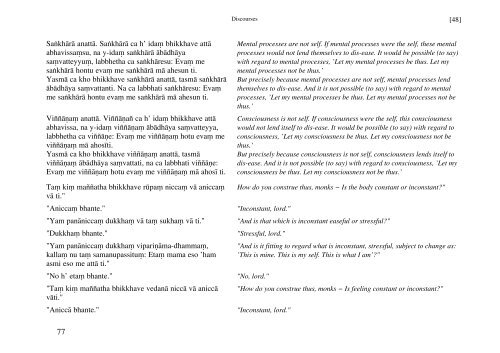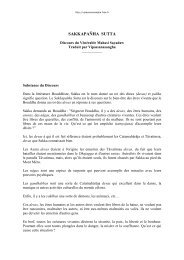Chomthong Chanting Book - Vipassanasangha - Free
Chomthong Chanting Book - Vipassanasangha - Free
Chomthong Chanting Book - Vipassanasangha - Free
Create successful ePaper yourself
Turn your PDF publications into a flip-book with our unique Google optimized e-Paper software.
Saïkhārā anattā. Saïkhārā ca h’ idaü bhikkhave attā<br />
abhavissaüsu, na y-idaü saïkhārā ābādhāya<br />
saüvatteyyuü, labbhetha ca saïkhāresu: Evaü me<br />
saïkhārā hontu evaü me saïkhārā mā ahesun ti.<br />
Yasmā ca kho bhikkhave saïkhārā anattā, tasmā saïkhārā<br />
ābādhāya saüvattanti. Na ca labbhati saïkhāresu: Evaü<br />
me saïkhārā hontu evaü me saïkhārā mā ahesun ti.<br />
Viññāõaü anattā. Viññāõañ ca h’ idaü bhikkhave attā<br />
abhavissa, na y-idaü viññāõaü ābādhāya saüvatteyya,<br />
labbhetha ca viññāõe: Evaü me viññāõaü hotu evaü me<br />
viññāõaü mā ahosīti.<br />
Yasmā ca kho bhikkhave viññāõaü anattā, tasmā<br />
viññāõaü ābādhāya saüvattati, na ca labbhati viññāõe:<br />
Evaü me viññāõaü hotu evaü me viññāõaü mā ahosī ti.<br />
Taü kiü maññatha bhikkhave rūpaü niccaü vā aniccaü<br />
vā ti."<br />
"Aniccaü bhante." "Inconstant, lord."<br />
Discourses [48]<br />
Mental processes are not self. If mental processes were the self, these mental<br />
processes would not lend themselves to dis-ease. It would be possible (to say)<br />
with regard to mental processes, ’Let my mental processes be thus. Let my<br />
mental processes not be thus.’<br />
But precisely because mental processes are not self, mental processes lend<br />
themselves to dis-ease. And it is not possible (to say) with regard to mental<br />
processes, ’Let my mental processes be thus. Let my mental processes not be<br />
thus.’<br />
Consciousness is not self. If consciousness were the self, this consciousness<br />
would not lend itself to dis-ease. It would be possible (to say) with regard to<br />
consciousness, ’Let my consciousness be thus. Let my consciousness not be<br />
thus.’<br />
But precisely because consciousness is not self, consciousness lends itself to<br />
dis-ease. And it is not possible (to say) with regard to consciousness, ’Let my<br />
consciousness be thus. Let my consciousness not be thus.’<br />
How do you construe thus, monks − Is the body constant or inconstant?"<br />
"Yam panāniccaü dukkhaü vā taü sukhaü vā ti." "And is that which is inconstant easeful or stressful?"<br />
"Dukkhaü bhante." "Stressful, lord."<br />
"Yam panāniccaü dukkhaü vipariõāma-dhammaü,<br />
kallaü nu taü samanupassituü: Etaü mama eso ’ham<br />
asmi eso me attā ti."<br />
"No h’ etaü bhante." "No, lord."<br />
"Taü kiü maññatha bhikkhave vedanā niccā vā aniccā<br />
vāti."<br />
"Aniccā bhante." "Inconstant, lord."<br />
77<br />
"And is it fitting to regard what is inconstant, stressful, subject to change as:<br />
’This is mine. This is my self. This is what I am’?"<br />
"How do you construe thus, monks − Is feeling constant or inconstant?"



